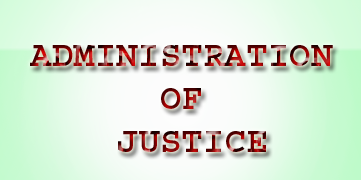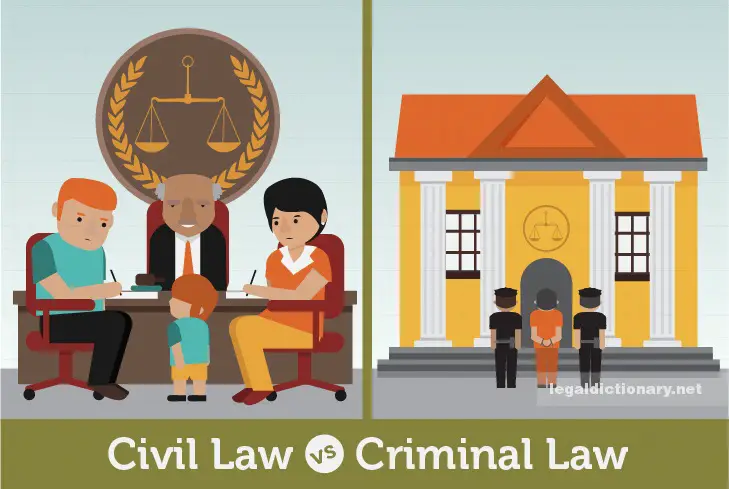Do you know the difference between Civil and Criminal Administration of Justice?
ADMINISTRATION OF JUSTICE
Introduction:
Administration of justice implies the maintenance of peace and order within a political community by means of physical force of the state. It is the modern and civilized substitute for the primitive practice of private vengeance and violent self help. Physical force of the state is the prime requirement for sound administration of justice. However, there are other factors which help administration of justice and command obedience of law. It includes social sanction, public opinion, custom, convenience, etc.

Notion or concept of justice:
The concept of justice is as old as origin of human society itself. The social nature of man demands that he must live peacefully in society. While living so, he experienced a conflict of interest and expects rightful conduct on the part of others. This is the reason why Salmond and Roscoe Pound have emphasized the importance of justice in their definitions of law. As Salmond rightly observed, “it is through the instrumentality of law that justice is administered by the state.” Likewise, Roscoe Pound held that, “Law is a body of principles recognised and enforced by state for administration of justice.” According to Blackstone, “Justice is reservoir from where the concept of right, duty and equity evolves.” From the above thoughts of jurists, we get to know the concept of justice.

Origin of administration of justice:
The administration of justice in modern civilized societies has evolved through stages. In the early stage when society was primitive and private vengeance and self help were the only remedies available to wronged person against the wrongdoer. He could get is wrongs redressed with the help of his friends or relatives. The second stage of development of society was characterised by the state coming into existence in its rudimentary form when its functions were only persuasive in nature. It did not have enforcing power by which it could punish the wrongdoer to the victim who was affected by the wrongful act. Thus up to this time the justice remained private in nature without compulsive force of the state .

Importance of administration of justice:
The necessity of force of the state for administration of justice has been emphasized by Jeremy Taylor who observed, “a herd of wolves is quieter and more at once than so many men unless they all had one reason in them or have one power over them.” Hobbes also believed that a common power was necessary to keep people within control in the community. Force is necessary to prevent the recalcitrant minority from gaining unfair advantage over law abiding people in general. Therefore, state force is inevitable for protection of rights of individuals in society.
Classification of Administration of justice:
Administration of Justice
Civil Criminal
[Enforcement of rights] [Punishment of wrongs]
I] Specific enforcement II] Sanctioned enforcement
Both in civil and criminal proceedings there is a wrong. The law will enforce a right only against a person who has already violated it or who has shown an intention to do so. Justice is administered only against wrongdoers. A wrong regarded as a subject matter of civil proceedings is called a civil wrong and a wrong regarded as the subject matter of criminal proceedings is termed as a criminal wrong or a crime.

Civil Justice:
The administration of civil justice consists in the enforcement of rights as opposed to the punishment for wrongs. The right to enforced may either be primary or a sanctioning right.
Primary rights are those rights which do not have the violation of another right. On the other hand, a sectioning right is one which arises out of the violation of another right. It is also called a remedial right because it comes into existence consequent to violation of private right. Thus one’s right not be libelled or assaulted is a primary right but right to obtain pecuniary compensation on being libelled or assaulted by some other person is a sanctioning right. Again, a right to fulfilment of a contract is primary right but right to recover damages for its breach is a sanctioning right.

Purpose of civil justice:
The purpose of civil justice is enforcement in civil proceedings, either a primary or a sanctioning right. A sanctioning right is one which arises out of the violation of another right.
e.g., When A publishes a defamatory statement about B, there is a violation of B’s right to reputation. B’s right to damages arises out of this violation. The right to damages comes into existence as a result of or by way of sanction for a wrong done by another. It is therefore called a sanctioning right. Any other right is a primary right. In our example, the right to reputation is primary right.
Criminal Justice:
The administration of criminal justice is to punish the offender. Punishment may be described as the infliction by the state authority, of a consequence normally regarded as a evil. [e.g. Imprisonment or death on an individual found to be legally guilty of a crime]

Purpose of criminal justice:
The main purpose of administration of criminal justice is to punish the offender. It is the state who punishes the criminals. Punishment necessarily implies some kinds of pain inflicted upon the offender or loss caused to him for his criminal act which may either be intended to deter him from repeating the crime or may be an expression of society’s misappropriation for his antisocial conduct or it may also be directed to form and regenerate him and at the time ported the society from criminals.

Conclusion:
In determining a nation’s rank in a political organisation, no test is considered more decisive than its administration of justice, for it has been conceived as one of the firmest pillars of any government. A state may not be called a state, if it has failed to discharge its functions concerning the administration of justice. Life may not be lived in society in which there is no preservation of the rights of men and no prevention of injustice. Be that as it may, it must be stated that the advantages of administration of justice far outweigh its disadvantages and it is an effective media for establishment of rule of law in modern democracies .
SHIVRAJ PATIL ,
MoDERN LAW CoLLEGE ,
PUNE.


